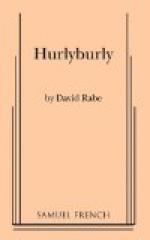|
This section contains 4,624 words (approx. 16 pages at 300 words per page) |

|
SOURCE: Radavich, David. “Collapsing Male Myths: Rabe's Tragicomic Hurlyburly.” American Drama 3, no. 1 (fall 1993): 1-16.
In the following essay, Radavich argues that what separates Hurlyburly from other works that explore male homosocial relationships is Rabe's use of comedy and satire.
Dramatic narratives of decadent, confused patriarchy under siege have dominated American theatre of the 1970s and '80s. David Mamet's stage works document the struggle of men to maintain close ties against a backdrop of mutual competitiveness, fear of and hostility toward women, and distrust of intimacy longed for but incapable of being acknowledged. Sam Shepard and David Rabe have mined the same area, with concentrated focus on the shifting tectonics of masculine longing, fear, and distrust. Rabe's Hurlyburly, one of the richest of these plays, anatomizes the homosocial quest for lasting male friendship in a world of fractured relations with women, corrupting work demands, and confused fraternal loyalties...
|
This section contains 4,624 words (approx. 16 pages at 300 words per page) |

|


